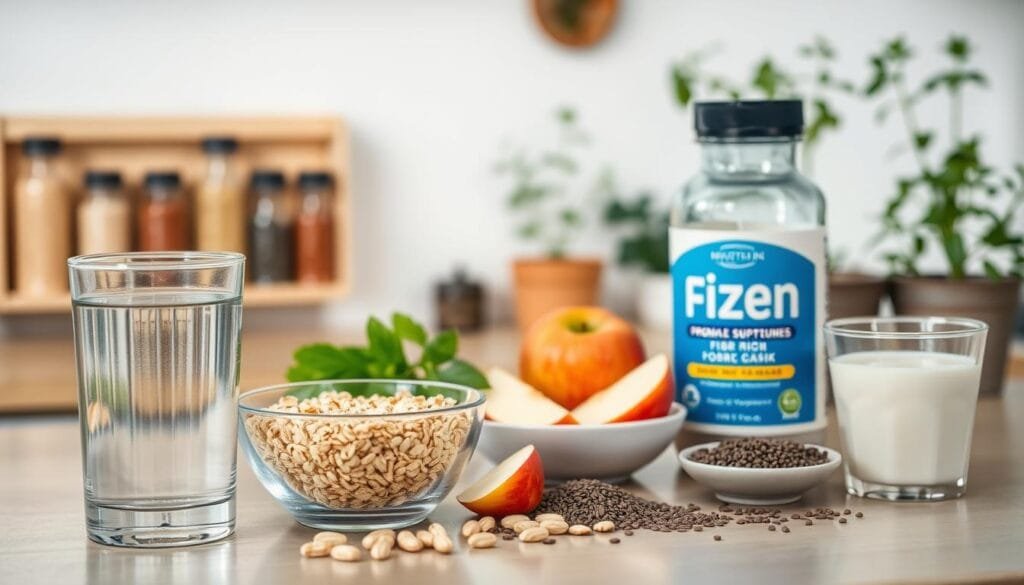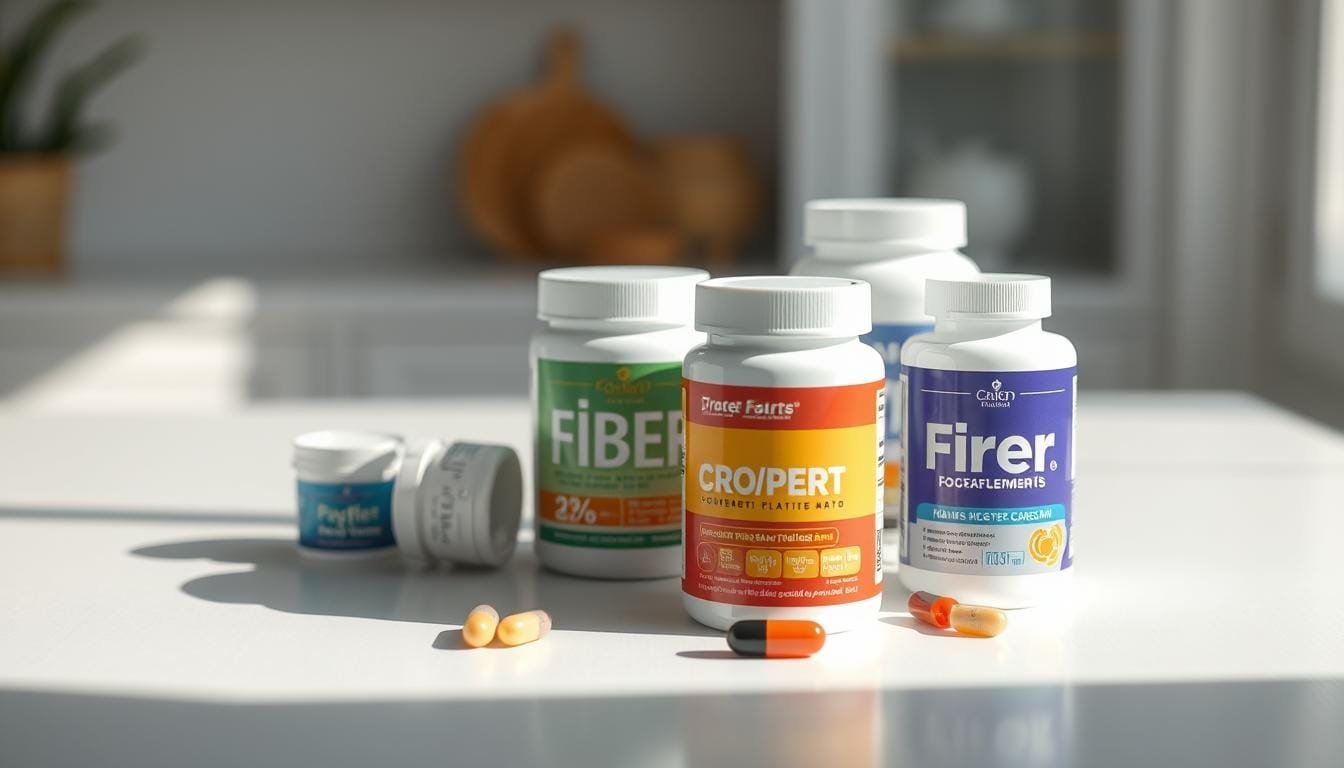Currently Empty: RM0.00
Did you know that 95% of Americans fail to meet their daily fiber needs? With only 5% hitting the recommended 22-34 grams, digestive health struggles are widespread. The NIH reports that 16 in 100 U.S. adults face constipation, while 179 million deal with diarrhea annually. Could the right supplement be the missing piece?
Wellness Concept, Malaysia’s trusted health advisor, helps navigate the complex world of fiber supplements. Whether you prefer powders or capsules, understanding the differences is key. Dr. Christine Lee, a leading expert, emphasizes that not all options work the same for everyone.
Natural food sources like fruits and whole grains are ideal, but busy lifestyles often make supplements necessary. Need guidance? WhatsApp +60123822655 for personalized advice. Business hours: Mon-Fri (9:30 AM–6:30 PM), Sat-Sun (10 AM–5 PM).
Key Takeaways
- 95% of Americans don’t get enough fiber daily.
- Digestive issues affect millions, from constipation to diarrhea.
- Supplements can bridge the gap when diet falls short.
- Wellness Concept offers expert advice for Malaysians.
- Personalized consultations are available via WhatsApp.
Understanding Fiber Supplements: Powder vs. Capsule
The gap between recommended and actual fiber intake is wider than many realize. While the USDA advises 22–34 grams daily, most Americans average just 16 grams. In Malaysia, busy lifestyles and processed food choices often lead to similar shortfalls. This deficit fuels digestive issues like IBS, affecting 25–45 million people globally.
What Are Fiber Supplements?
These are concentrated sources of dietary fiber, designed to complement meals. They come from natural ingredients like psyllium husk or synthetic options such as methylcellulose. Unlike whole foods, they offer precise dosing for those struggling to meet needs through diet alone.
Common forms include:
- Powders (mixable with liquids)
- Capsules (quick and portable)
- Gummies (palatable for picky eaters)
Why Consider Fiber Supplements?
For Malaysians jugging hectic schedules, supplements provide a practical solution. Soluble fiber (like wheat dextrin) supports gut health, while insoluble fiber aids regularity. However, Dr. Lee cautions: “There’s no one-size-fits-all—individual needs vary.”
Potential considerations:
- Cost varies by brand and formulation
- Some may interact with medications
- Local digestive complaints often include bloating and irregularity
Choosing wisely requires understanding these nuances. Next, we’ll explore fiber types in depth.
Types of Fiber: Soluble vs. Insoluble
Not all fiber works the same way—some dissolve, while others add bulk. These differences define their health benefits and how they interact with your body. Knowing which type to prioritize can optimize digestion and overall wellness.
Soluble Fiber Benefits
Soluble fiber dissolves in water, forming a gel that slows digestion. This helps regulate blood sugar spikes and lowers cholesterol by binding to LDL particles. Oats, apples, and beans are rich sources.
Its gel-like action also feeds gut bacteria, acting as a prebiotic. Dr. Lee notes: “Regular intake can reduce heart disease risk by up to 15%.” Products like Metamucil leverage this mechanism.
Insoluble Fiber Benefits
Insoluble fiber doesn’t dissolve, adding bulk to stool and speeding transit time. Brown rice, spinach, and nuts are packed with it. This type is ideal for combating constipation and managing IBS symptoms.
Unlike soluble fibers, it doesn’t break down, making it a natural scrub for the intestines. Brands like Fibercon focus on this quick-relief approach.
For a deeper dive into fiber’s role, explore our guide on fiber’s health benefits. Balancing both types ensures a happy gut and long-term wellness.
Powder Fiber Supplements: Pros and Cons
Many health-conscious individuals overlook the flexibility that powdered supplements offer. Unlike capsules, they blend seamlessly into drinks and meals, making them a versatile choice for boosting daily intake. Brands like Metamucil provide 3g per serving, while Bellway’s formula packs 5g—ideal for tailored dosing.
Advantages of Powder Form
Powders excel in customization. They mix effortlessly with teas, smoothies, or even yogurt, adapting to personal taste preferences. Flavored options—like citrus or berry—mask earthy notes, and sugar-free varieties cater to diabetics.
Dosing control is another perk. A scoop lets users adjust grams based on needs, unlike fixed-dose capsules. Garden of Life’s organic formula, for example, delivers 9g of fiber, ideal for higher requirements.
| Brand | Fiber per Serving | Cost (MYR/serving) |
|---|---|---|
| Metamucil | 3g | 1.20 |
| Bellway | 5g | 1.50 |
| Garden of Life | 9g | 2.10 |
Potential Drawbacks
Psyllium husk-based powders require ample water to prevent choking or bloating. Improper hydration can lead to throat irritation—a risk capsules avoid.
Texture divides opinions. Some find the gel-like consistency off-putting, and on-the-go use is less convenient. Premium brands also cost more per serving than basic options.
For Malaysians seeking digestive support, powders offer adaptability but demand mindful usage. Wellness Concept’s nutritionists can guide choices via WhatsApp for personalized advice.
Capsule Fiber Supplements: Pros and Cons
For those always on the move, capsule supplements offer unmatched convenience. They’re pre-measured, mess-free, and ideal for busy lifestyles. Brands like Fibercon pack 70 doses per bottle, while CPC uses synthetic compounds for consistent results.

Benefits of Capsules
Travel-friendly portability sets these products apart. Unlike powders, they fit neatly into pillboxes or pockets—no spills or mixing required. Enteric coatings ensure slower release, reducing sudden bloating.
Absorption differs too. Calcium polycarbophil, a common ingredient, swells in the intestines, aiding regularity without excess water intake. Thorne’s vegan capsules cater to dietary restrictions, while Benefiber offers budget-friendly options.
“Capsules are gentler on the body for sensitive stomachs,” notes a Wellness Concept nutritionist.
Limitations to Consider
Swallowing difficulties can deter some users. Larger pills may require practice or splitting. Delayed action also means effects take hours—unlike powders’ quicker response.
Potential drawbacks include:
- Higher cost per serving compared to bulk powders
- Limited flavor options (unlike flavored powders)
- Possible gas if introduced too quickly
For Malaysians prioritizing ease, capsules are a strong contender. WhatsApp Wellness Concept to explore tailored options.
How to Choose the Right Fiber Supplement for You
Choosing the right supplement starts with understanding your body’s unique needs. Whether you’re managing digestive discomfort or optimizing wellness, aligning your choice with health goals ensures better results. A symptom checklist—like bloating or irregularity—helps narrow options.
Assessing Your Health Goals
Constipation and diarrhea require different dietary approaches. Soluble fibers (like psyllium) ease diarrhea, while insoluble types (wheat bran) relieve constipation. For 10–15% with underlying conditions like colon cancer risks, a doctor’s screening is crucial before starting supplements.
Age also matters. Older adults may need gentler formulas, while pregnant women should prioritize safety-certified options. Wellness Concept’s nutritionists tailor advice based on medical history and lab results.
Lifestyle and Convenience Factors
An office worker’s needs differ from an athlete’s. Busy professionals might prefer capsules for portability, while fitness enthusiasts could opt for mixable powders post-workout. Budget plays a role too—premium brands cost more but offer cleaner ingredients.
Consider timing. Morning routines pair well with fiber-rich smoothies, while evening doses may disrupt sleep. For personalized guidance, WhatsApp Wellness Concept at +60123822655 to match your schedule with the ideal type.
Expert Tips for Incorporating Fiber into Your Routine
Optimizing fiber intake requires smart strategies beyond just choosing a supplement form. Small adjustments in timing, pairings, and dosage can enhance digestion and overall wellness. Here’s how to make fiber work seamlessly for your lifestyle.

Dosage and Timing
Start with 3–5g daily to let your body adjust. Sudden spikes may cause bloating. Gradually increase by 2g every 3–4 days until reaching the desired amount.
Morning intake pairs well with breakfast, while evening doses might disrupt sleep. For travel, pack single-serving sticks or pre-measured capsules to stay consistent.
| Goal | Recommended Timing | Notes |
|---|---|---|
| Constipation relief | Before bed | Allows overnight action |
| Blood sugar control | With meals | Slows glucose absorption |
| Energy boost | Post-workout | Mix with protein shakes |
Combining Fiber with Other Nutrients
Pair soluble fiber with healthy fats (e.g., avocado or nuts) to enhance fat-soluble vitamin absorption. Prebiotic fibers feed gut bacteria, amplifying probiotic benefits—try yogurt with flaxseed.
Hydration is non-negotiable. Drink 8oz of water per 5g of fiber to prevent blockages. Avoid taking fiber with coffee, as caffeine’s diuretic effect may counteract hydration.
“Cycling fiber types—like alternating psyllium and wheat dextrin—prevents tolerance buildup,” advises a Wellness Concept nutritionist.
For personalized plans, explore Wellness Concept’s trial packs. WhatsApp +60123822655 to match your needs with science-backed solutions.
Conclusion
A well-functioning gut is the foundation of overall wellness. Whether opting for mixable blends or portable options, the right fiber supplements should match individual needs and lifestyles.
Always consult a healthcare provider before starting, especially with conditions like colon cancer risks. Malaysians can easily connect with Wellness Concept via WhatsApp for tailored advice.
Business hours: Mon–Fri (9:30 AM–6:30 PM), Sat–Sun (10 AM–5 PM). Personalized plans ensure long-term digestive health without guesswork.
Ready to take control? Message today to start your journey toward a balanced day.
FAQ
What’s the difference between soluble and insoluble fiber?
Soluble fiber dissolves in water, forming a gel that helps regulate blood sugar and lower cholesterol. Insoluble fiber adds bulk to stool, supporting digestive health and preventing constipation.
Are fiber supplements as effective as natural sources?
While whole foods offer additional nutrients, supplements like psyllium husk can help fill gaps in dietary intake. For best results, combine both for balanced gut health.
How much fiber should adults consume daily?
The USDA recommends 25 grams for women and 38 grams for men. Start with smaller amounts to avoid bloating and gradually increase intake.
Can fiber supplements help with weight management?
Yes! Soluble types promote fullness, reducing overeating. Pairing them with water enhances their effect, making them a useful tool for healthy weight control.
Do fiber powders or capsules cause digestive discomfort?
Some people experience gas or bloating initially. Drinking plenty of water and slowly adjusting the dose can minimize these side effects.
Are there prebiotic benefits to taking fiber supplements?
Certain fibers, like inulin, act as prebiotics—feeding beneficial gut bacteria. This supports immunity and overall digestive wellness.
Should I consult a doctor before starting fiber supplements?
Absolutely, especially if you have conditions like IBS or take medications. A healthcare provider can recommend the best type and dosage for your needs.



